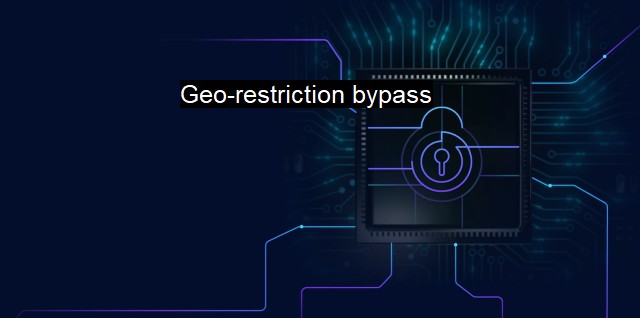What are Geo-restriction bypass?
Breaking Down Geo-Restrictions: Exploring the Causes, Impacts, and Benefits of Virtual Private Networks (VPNs)
Geo-restriction bypass is a technique used to circumvent geographical limitations imposed on online content. This method is commonly deployed by individuals across the globe who face restrictions when they attempt to access specific types of content due to their geographical location, a principle known as geo-blocking.This concept is utilized by many websites and online service providers to restrict access to their content based on a user's geographical location. These geo-restrictions or geo-blocks are placed largely due to licensing issues, regulatory concerns, or even political restrictions in certain regions.
a movie streaming platform like Netflix has a different library of content available for every country due to licensing restrictions. As a result, users from each specific geographical region are limited to the content specifically tailored to that region, restricting them from viewing global content. These geo-restrictions can even be stricter, with some online sites completely blocking access from certain countries.
So, how does geo-restriction bypass assist in such a scenario? One of the common techniques to bypass these geographical restrictions involves masking or changing your IP (Internet Protocol) address, which is how most geo-restrictions work. Service providers determine the geographical location of their users through their IP addresses.
VPN, or Virtual Private Network, is a popular tool to bypass geo-restrictions. By deploying a VPN, users can create a secure connection to a server located in a different part of the world, thus masking their actual IP address with a new one associated with the geographical region of the chosen server. Consequently, users are able to appear from any region they choose, bypassing any geo-restrictions imposed by online platforms.
Another method to bypass geo-restriction is by using Proxy Servers. A Proxy Server works as an intermediary between the user and the internet. When users send a request to access a website, the request is first sent to the proxy server which then forwards that request to the destination website.
While geo-restriction bypass seems like a useful tool in maximizing internet freedom, it isn't without potential risks. Many security and privacy concerns arise with the use of a VPN or other bypass tools. Using a VPN involves routing your traffic through servers located in other parts of the world. If these servers are not secure or not managed by a reputable VPN provider, it's conceivable for your data to be compromised, intercepted, or even manipulated.
These risks underline the importance of considering cybersecurity when choosing to bypass geo-restrictions, either through the use of a reputable VPN service with robust security measures or another method with trustworthy security protocols. Equally important is the need for active and up-to-date antivirus software. An efficient antivirus can protect important data and system resources from threats such as malware, ransomware, and other malicious codes, which become increasingly possible when connectivity is being routed through servers across the globe.
While geo-restriction bypass presents users with the freedom to access various global content undeterred by geopolitical limitations, it urges cybersecurity concerns that call for necessary precautions. A balance between bypassing geo-blocking barriers and preserving security must be achieved by being mindful of our methods and decisions concerning this subject matter.

Geo-restriction bypass FAQs
What is geo-restriction bypass and why is it important in cybersecurity and antivirus?
Geo-restriction bypass refers to techniques or tools that allow users to bypass internet restrictions implemented by websites or governments in specific regions. It is essential in cybersecurity and antivirus since it allows users to access otherwise inaccessible resources, which helps them identify and address potential cyber threats.Are there legal concerns associated with using geo-restriction bypass tools?
The legality of geo-restriction bypass tools varies by jurisdiction. Some countries have laws that prohibit the use of such tools, while others regulate their use. It is crucial to review the legal implications of using such tools in your region before using them.Are all geo-restriction bypass tools safe to use?
No. Just like any other cybersecurity tool, some geo-restriction bypass tools may compromise your safety by exposing your personal information to potential attackers. Therefore, it is essential to research and identify reputable tools that will not compromise your safety.Can using geo-restriction bypass tools affect my antivirus software's effectiveness?
It depends on the specific tool and the antivirus software you are using. Some geo-restriction bypass tools may interfere with antivirus software's functionality, making it less effective. Consequently, it is crucial to conduct proper research to identify tools that work in tandem with your antivirus software without compromising its effectiveness.| | A | | | B | | | C | | | D | | | E | | | F | | | G | | | H | | | I | | | J | | | K | | | L | | | M | |
| | N | | | O | | | P | | | Q | | | R | | | S | | | T | | | U | | | V | | | W | | | X | | | Y | | | Z | |
| | 1 | | | 2 | | | 3 | | | 4 | | | 7 | | | 8 | | |||||||